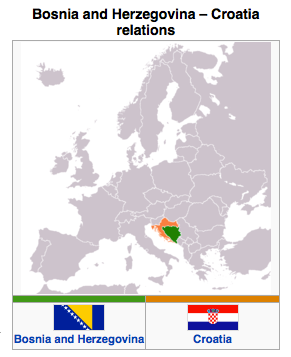Bosnians, Croats Mull Border Issues In Brussels
By Elvira M. Jukic
A trilateral meeting of Bosnian, Croatian and EU officials in Brussels discussed open questions between the two countries, with a focus on border problems around the Bosnian coastal town of Neum.
Bosnian, Croatian and European officials met in Brussels to hammer out unresolved border issues between the two countries in the run-up to Croatia’s EU accession next year.

Bosnian Foreign Minister Zlatko Lagumdzija described the meeting as fruitful but warned that not all questions were resolved.
“Open questions concern free transit in and out of the [Croatian] port of Ploce and the [Bosnian] town of Neum, a road bypassing Neum and border crossings with food inspection checks,” Lagumdzija said.
He was referring firstly to Croatian plans to connect two sections of southern Dalmatia that are separated by the Bosnia’s 20 kilometres of Adriatic coastline around the town of Neum.
One Croatian idea is to build a bridge linking the two parts of Croatia, but Bosnia fears that this might hamper its access to the open sea.
Another idea is to build a land corridor north of Neum towards Croatian Dubrovnik, but locals from Neum have protested, saying that a corridor would isolate them from the rest of Bosnia-Herzegovina.
Bosnia and Croatia share a border of around 1,000 kilometers but the two countries have never signed a border deal.
The two former presidents, Alija Izetbegovic and Franjo Tudjman, signed a border agreement in 1999 but the two parliaments did not ratify it.
Bosnia “wants to solve all this in a positive atmosphere to satisfy both countries and its citizens,” Lagumdzija said.
He told the daily newspaper Dnevni avaz that Bosnia will do everything to help Croatia determine its borders, which from next year will be the EU’s external border, but not at the expense of its maritime access.
Croatian Foreign Minister Vesna Pusic said that around 75 per cent of the open questions on the agenda had already been solved.
“Different kinds of links between the territories are being considered and expenses are being compared, having in mind that we must not isolate Bosnia and Herzegovina,” Pusic said.
Bosnian Transport Minister Damir Hadzic said the best solution would be if both countries accepted the 1999 border deal agreed between the two former presidents.
Croatia is under pressure to close any remaining open border issues with its neighbours before becoming an EU member on July 1 next year.
